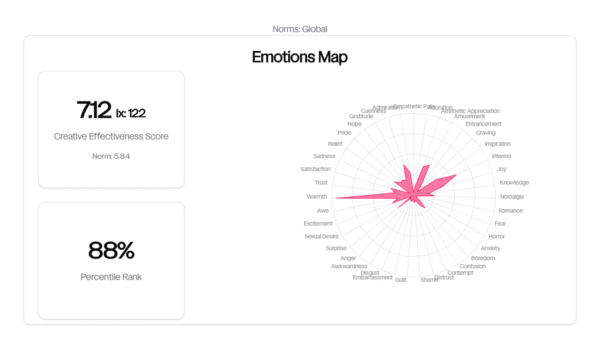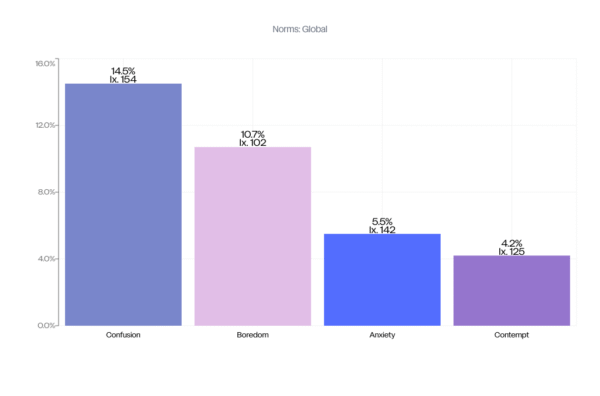The machines are coming – and this time they want your hearts. That’s right, like a robot short-circuiting in a puddle of its own oily tears, AI startups are getting all emotional.
With the AI sector entering its advertising era amid explosive growth – awkwardly donning its teenage garb and stepping into the spotlight – many AI companies are turning to emotional storytelling in their brand campaigns in an effort to capture consumer attention and loyalty.
Recent high-profile campaigns from companies such as OpenAI and Anthropic have leaned heavily on emotional narratives to humanise their technology and build trust.
But as the AI sector enters the latest stage of its explosive growth, is this new emotionally-driven approach to advertising actually working?
Well, here at DAIVID, we put it to the test. Using our advanced content testing technology, we measured how audiences reacted to some of the latest AI brand campaigns. The brands featured in the study include startups OpenAI, Perplexity and Anthropic, as well as ads for AI products developed by big tech players Meta and Google.
Our human-trained, AI-powered creating testing platform is trained on tens of millions of human responses to ads to predict how ads will go down with viewers.
What we discovered was revealing. While certain campaigns did succeed in sparking strong positive emotional responses, others missed the mark. Instead of building a connection, some ads left viewers feeling confused, anxious and even angry.
But which recent campaigns hit the emotional mark? And which failed to make us feel anything?
Let’s look at the results more closely.
1.ChatGPT’s “Everyday Moments” campaign is most effective
ChatGPT last week launched its first brand campaign, “Everyday Moments”, featuring a trio of short films – “Road Trip”, “Dish” and “Pull Up” – that turn everyday stories into subtle product demos.
Using DAIVID’s Creative Effectiveness Score (CES) – a composite metric combining attention, emotion and memory – we found the campaign performed very well, with all three ads scoring the highest among the campaigns tested.
Recent brand campaigns from AI companies – most effective
| Rank | Brand | Campaign | Overall effectiveness (out of 10) |
| 1. | Open AI | “Everyday Moments: Road Trip” | 7.12 |
| 2. | Open AI | Everyday Moments: Pull Up” | 6.91 |
| 3. | Open AI | “Everyday Moments: Dish” | 6.82 |
| 4. | Google – Gemini. | “Dream Job” | 6.57 |
| 5. | Google – Gemini | “Party Blitz” | 6.46 |
| Norm | 5.8 |
In fact, all three ads were among the top 20% of ads ever tested by DAIVID after they all generated strong positive emotions, above average attention throughout and correct brand recall.
“Road Trip” was the most effective of the three, with a score that puts it in the top 12% of ads in DAIVID’s database.
The ad was twice as likely to make people feel feelings of warmth than the average ad, while feelings of trust (+37%), nostalgia (+30%) and gratitude (+24%) were also well above the norm.
The chart below shows emotions generated by “Road Trip” and the ad’s overall effectiveness.
ChatGPT Road Trip – Emotional Map

2. Claude is an unwelcome visitor
Anthropic’s “Keep Thinking with Claude”, launched a few weeks earlier, did not receive quite the same reception, however.
The ad’s potent messaging simply did not resonate among viewers. The ad generated intense negative emotions from four out of 10 viewers – the most of any ad in the study – making it nearly 50% more likely to generate a negative response than the average campaign.
Recent brand campaigns from AI companies – most negative responses
| Rank | Brand | Campaign | % of people who had intense negative emotions |
| 1. | Anthropic | “Keep thinking with Claude” | 40.7% |
| 2. | Perplexity | “Perplexity Questions” | 33.0% |
| 3. | Meta | “Your personal AI – Goldfish”. | 28.8% |
| 4. | Google – Gemini | “Party Blitz” | 26.3% |
| 5. | Google – Gemini | “Dream Job” | 26.2% |
| Norm | 27.4% |
Feelings of confusion were 54% higher than the average ad, while feelings of anger (+61%), awkwardness (+52%) and anxiety (+42%) were also well above the norm.
These feelings of confusion also meant the ad generated the lowest levels of attention of any ad tested as part of the study.
The chart below shows some of the negative emotions the ad overindexed for.
Anthropic’s “Keep Thinking with Claude”

The ad is also 11% less likely to generate intense positive emotions than the average ad. However, people did feel 18% more knowledgeable after watching the ad, while the ad did generate feelings of trust that were 12% above the norm.
Overall, it meant the ad was unlikely to inspire people to act after watching. They were 11% less likely to share the brand, 18% less likely to recommend the brand, 19% less likely to search for the brand and 26% less likely to buy the product.
3.Google’s Super Bowl ad scores an emotional touchdown
Emotions certainly run high at the Super Bowl – and that was certainly the case with Google’s Big Game spot earlier this year.
The ad generated the most intense positive emotional responses of any ad in the study, 4.7% higher than the average ad.
Recent brand campaigns from AI companies – ranked by emotional engagement
| Rank | Brand | Campaign | % of people who had intense positive emotions |
| 1. | Google – Gemini | “Dream Job”. | 51.0% |
| 2. | Open AI | “Everyday Moments: Road Trip” | 50.1% |
| 3. | Open AI | Everyday Moments: Pull Up”. | 48.6% |
| 4. | Open AI | “Everyday Moments: Dish” | 47.8% |
| 5. | Google – Gemini | “Photos and Files” | 47.6% |
| Norm | 48.7% |
The most prominent emotions it generated were intense feelings of warmth (+57% above the norm), trust (+54%) and adoration (+48%).
4. Perplexity’s Squid Game ad makes people laugh, but not everyone was in on the joke
“Perplexity Questions”, starring Squid Game actor Lee Jung-jae, scored in the bottom 40% of ads tested by DAIVID for overall effectiveness after generating the least positive emotions from viewers and below average attention levels throughout. It also generated the second highest negative responses.
One of the key negative emotions was confusion, with viewers 23% more likely to be left scratching their heads than the average ad after watching.
This is possibly among those who have not watched Squid Game and maybe felt they were not in on the joke.
But it did make some people laugh, with viewers finding the ad 22% funnier than the average ad. With the Perplexity app playing a key role in the ad, correct brand recall was also 36% higher than the industry norm.
5.But emotional approach is building trust
While some of the ads failed to resonate, what does seem apparent is this more emotionally-driven approach is actually starting to build trust. Looking at all the campaigns we tested, all generated feelings of trust that were at least slightly above the industry norm.
Now, this may be due to the fact that AI is now mainstream and we are becoming more comfortable with the roles it plays in our daily lives.
But by focusing on the human stories and showing how AI assistants are playing an increasingly important role on how they live is succeeding in building a key emotion to driving sustained growth.


